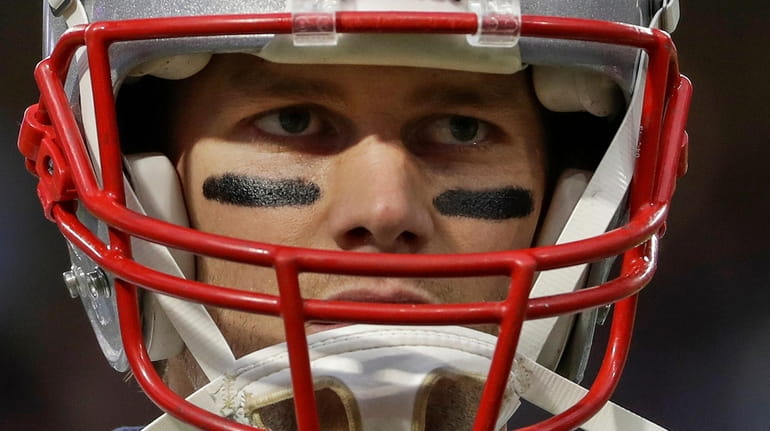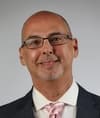Who would be baseball's equivalent of new Buccaneers QB Tom Brady?

Patriots quarterback Tom Brady warms up before Super Bowl 52 against the Eagles in Minneapolis on Feb. 4, 2018. Credit: AP/Matt Slocum
The news that Tom Brady left the Patriots got me thinking about what the baseball equivalent might be.
A great player — one of the greatest of all time — leaving his original team as a free agent in the latter stages of his career. Not as a washed-up version of himself but as a potentially still-great player.
People always talk about Joe Namath finishing his career with the Rams or Willie Mays stumbling around the outfield with the Mets as examples of great players who sadly finished their careers with other organizations when they had little left to offer on the field.
Brady leaving the Patriots isn’t that. Even at 42, he still is good enough to lead the right team to the Super Bowl. For Brady, that team is the Buccaneers.
The best baseball example of this I could think of was Pete Rose leaving the Cincinnati Reds in 1978 to sign with the Philadelphia Phillies for what was then the largest contract in baseball history: four years and $3.4 million.
Rose was 37. He had passed 3,000 hits but was not yet baseball’s all-time hit king. He had not been banned from baseball for life, had not been disqualified from consideration for the Hall of Fame and was not yet a fixture at seemingly every autograph-signing venue in America.
After thrilling the nation with a 44-game hitting streak in the summer of 1978, Rose was famous. Infamy would not come until years later.
Rose was coming off the 12th of what would end up being 17 All-Star Game selections. He was a former Rookie of the Year, a former MVP, a three-time batting champion and the MVP of the 1975 World Series, in which he hit .370 in the first of The Big Red Machine’s back-to-back titles.
He didn’t have Brady’s rings, but he had enough of his own. He was considered one of the best players in baseball, and though older, he was expected to show the Phillies how to win.
Paul Owens, then the Phillies’ director of player personnel, said at the time in a Sports Illustrated story: “There isn’t much doubt in my mind that he can play another three years. He’s got the kind of body that doesn’t wear down. And he has so many intangibles. He’s proud. He works hard. He’s a leader. And the son of a gun can still hit . . . With a contending team, he could be the difference between a winner and a bridesmaid.”
Change the word “hit” to “throw” and that could be a statement about Brady.
Before signing with anyone, Rose was willing to try on caps of other teams who were thought to be interested. (Hard to imagine an athlete doing that today.) One of them was the Phillies. Rose was asked what he thought of that team.
“They need me,” he said.
Turned out he was right. The Phillies had been knocked out of the NLCS three years in a row from 1976-78. In his second season there — 1980 — the Phillies won the World Series, the franchise’s first title.
Brady is confident and can be cocky. Rose was that times 100. He wasn’t apologetic about wanting to be the highest-paid player in the game.
“I’ve worked as hard as anybody in baseball for 16 years,” he said after negotiations with the Reds broke down. “I’ve been more consistent than anybody. I reached 3,000 hits faster than any guy in history. I really believe I’ve reached the top of my profession, and I want to be paid like it.”
Rose backed up his brashness in his first season in Philadelphia, hitting .331 with an .848 OPS and banging out 208 hits in 1979. But the Phillies went 84-78 and finished fourth in the NL East.
In 1980, Rose slipped to .282 with a .706 OPS. But the Phillies won the NL East title, beat the Astros in the NLCS with Rose hitting .400, and topped the Royals in six games in the World Series.
Rose hit just .261 in the World Series. But he won his third and final ring.
That’s half as many as Brady.
Rose went on to play forever, or at least until 1986, when he was 45. Then his troubles began and his legacy became something other than what he thought it would be when he left the Reds for the Phillies to — as Brady might put it — start his next baseball chapter.

